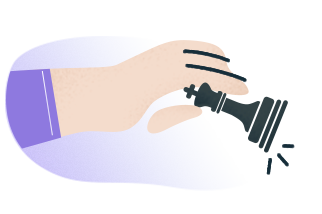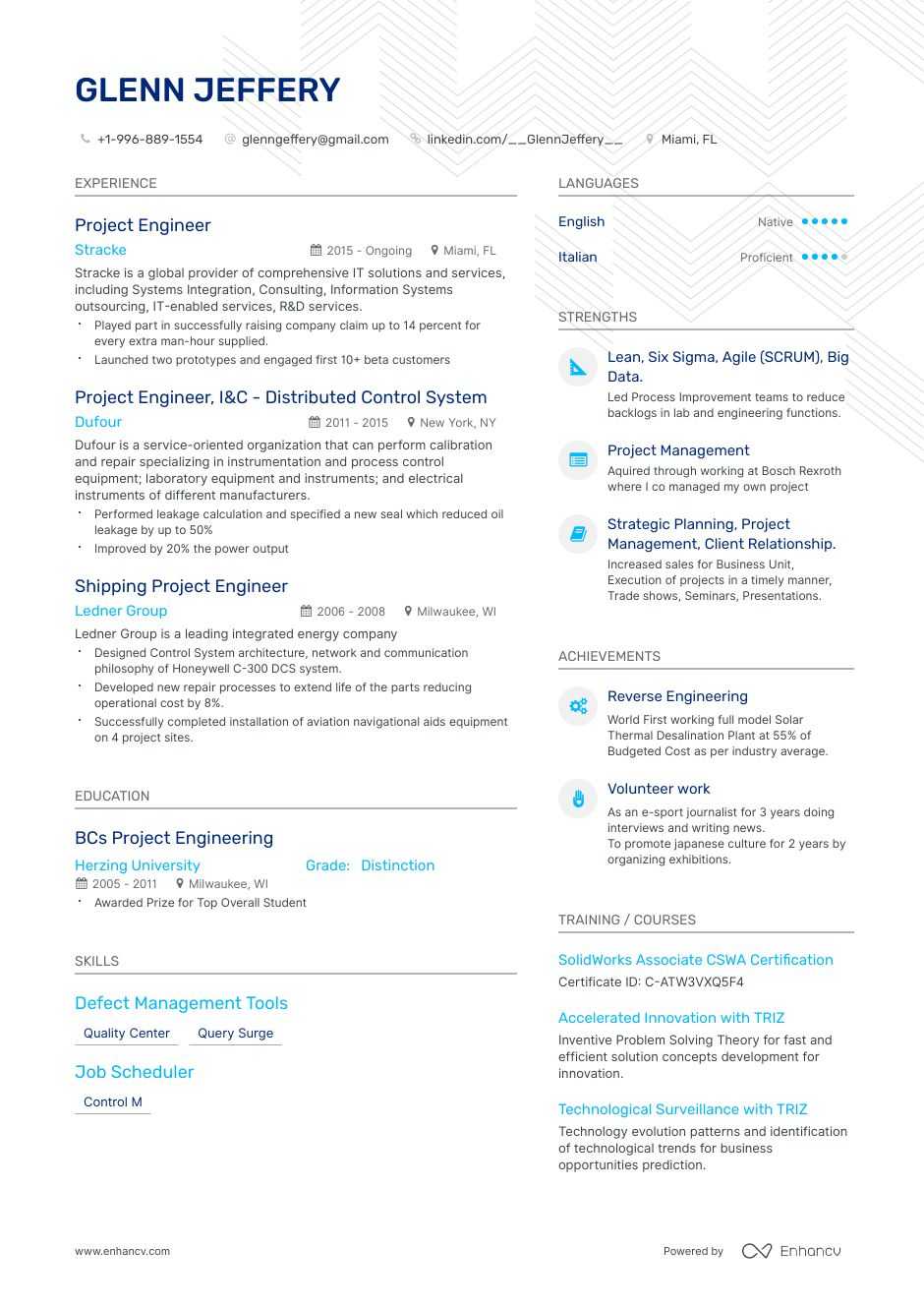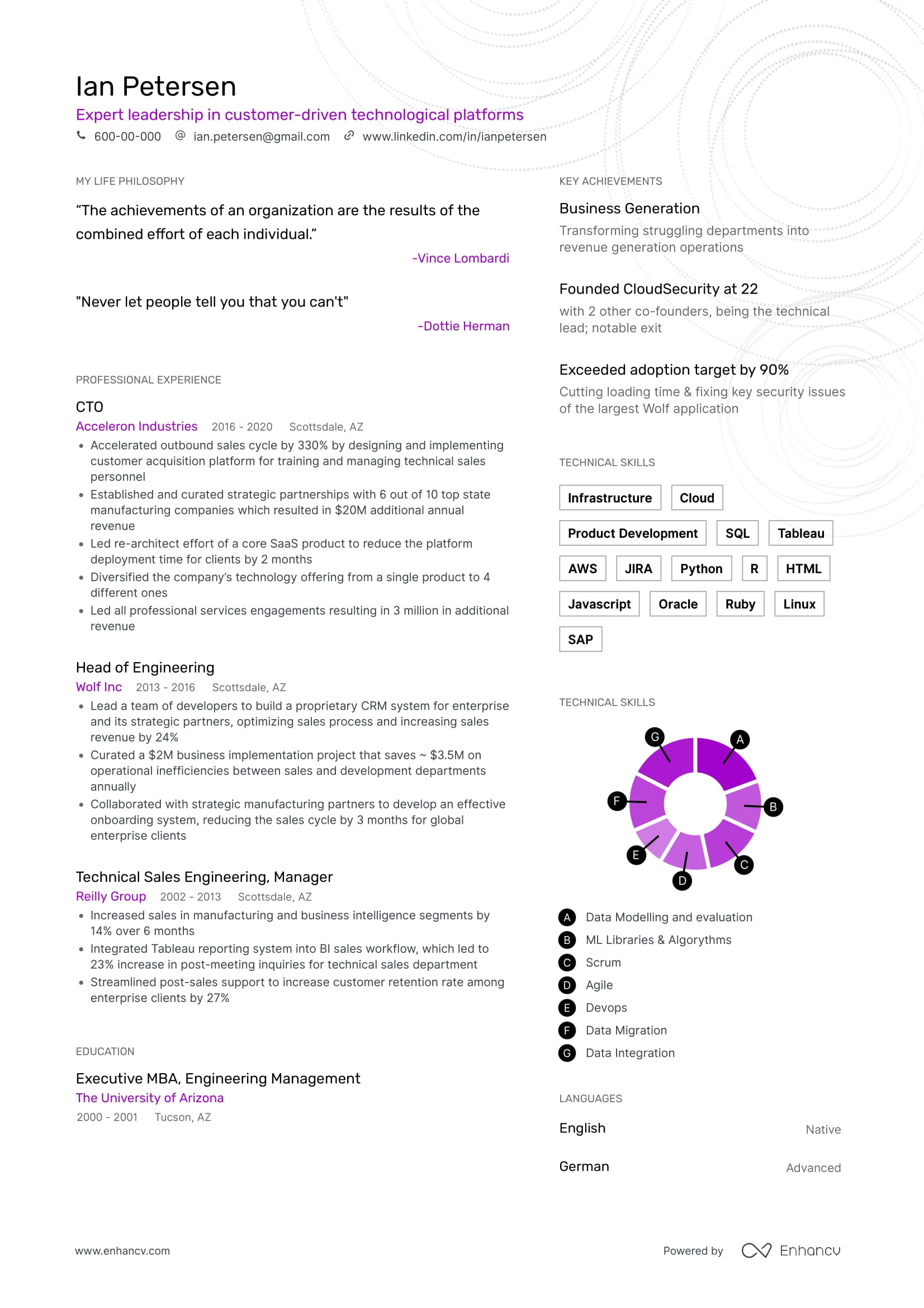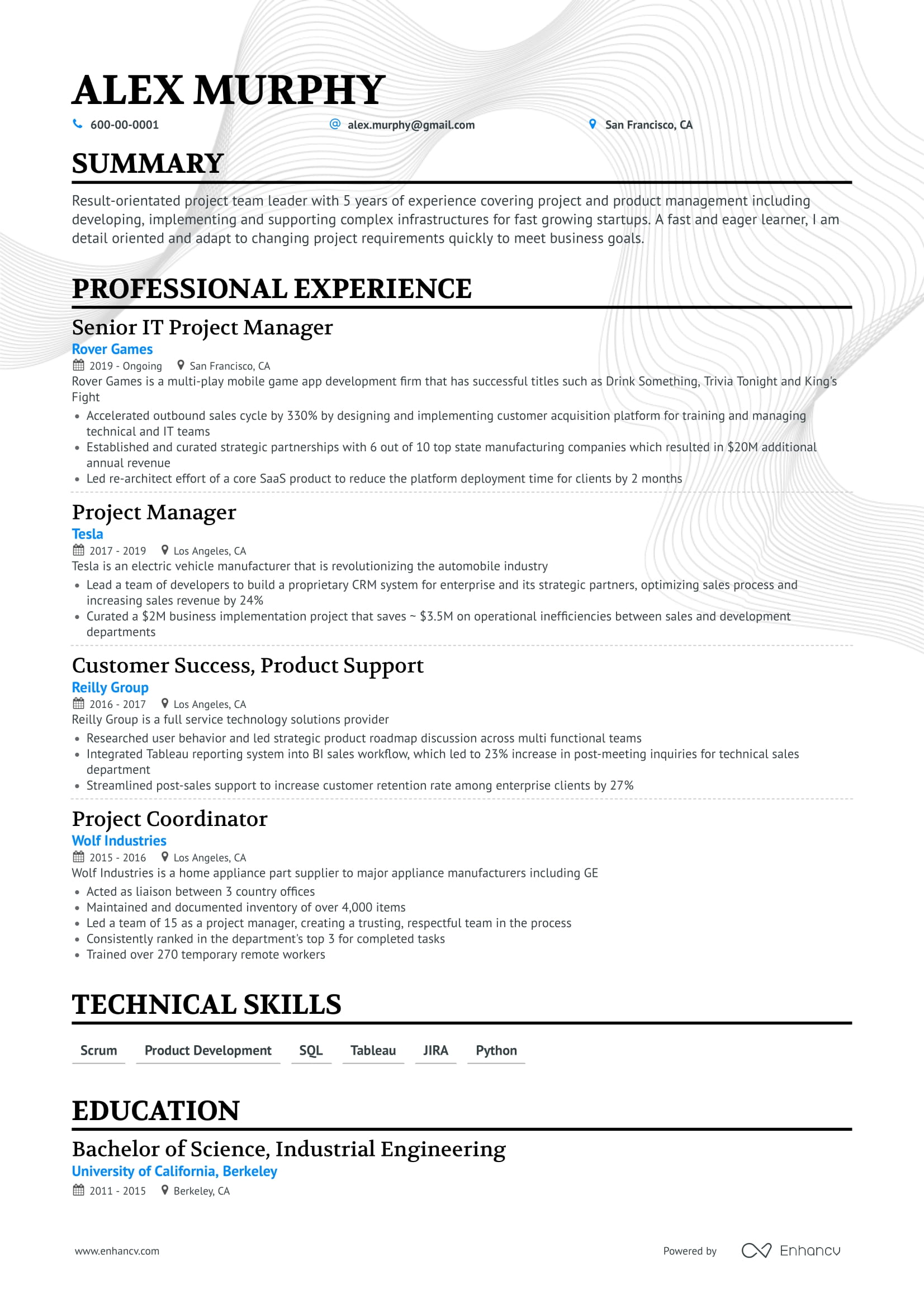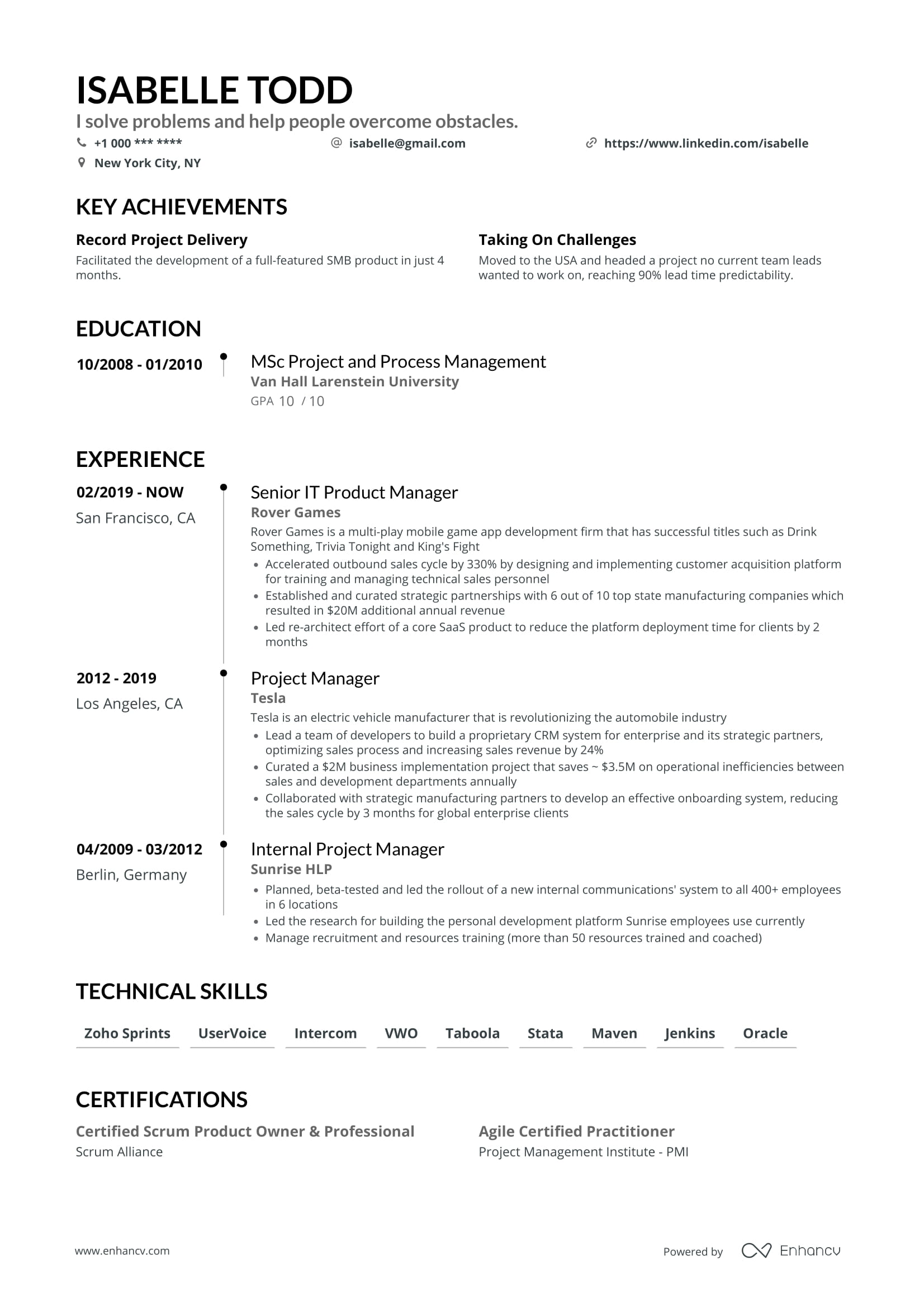Example Project Engineer Resume - Browse more resume templates and build a stand-out resume
Having trouble with your Project Engineer Resume?
Put yourself in the shoes of the Hiring Manager.
They’ll look for someone who stands out with ideas and drawings that bond thousands of contractors, engineers, and architects.
As a Project Engineer, you must overcome the challenge of demonstrating engineering, management and communication skills on a limited space.
Your first project is to transform that unattractive piece of paper into a stunning Project Engineer resume.
Furthermore, each job posting will require a mix of different proportions.
How do you tailor your resume perfectly? That’s what we’ll teach you in the following sections.
What will you learn today
- Real Project Engineer resume samples & examples that got people hired
- What structure and layout will allow you to convey the most information in a limited space
- How to make sure you show your value proposition in just a few experience bullet points
- What skills, certificates, and hobbies will give you an edge over other applicants
Project Engineer resume examples
Looking at these Project Engineer resume samples, you should already get ideas about how to improve your own and add more impact.
Here are 4 other related resume examples and guides
How to write a perfect Project Engineer resume
One big mistake applicants make here is not thinking about who’s going to read your resume.
When a Project Manager or Senior Engineer looks at your resume, they will expect to see that you:
- Kept the project within budget and projected time frames
- Optimized execution time, cost and material use
- Maintained all legal regulations and compliance codes
- Managed the workforce effectively and ensured a high degree of safety on the site
To get all of this information across in just a single page, you need to use the proper resume layout.
What are the most common Project Engineer resume layout types?
Depending on the case, you can resort to a different resume layout:
- Reverse chronological - this resume layout focuses on your work experience and education in a timeline format. It goes from recent to past.
- Hybrid - this resume layout features the most relevant skills and work experience based on the individual application.
Project Engineers will appreciate the hybrid resume layout.
It allows you to feature your core competencies up top and back them up with work experience.
As a Project Engineer, your day to day job will require you to be creative and invent solutions to unique problems.
The skills you’ve mastered throughout your work are more important than the job titles you held.
Whatever layout you choose, your Project Engineer resume needs to include several core sections that recruiters and automated HR software will look for.
What are the important sections of a Project Engineer resume
- Resume header
- Resume summary
- Core qualifications
- Work experience - projects
- Education, certificates and digital competences
How to create an impactful Project Engineer resume header
As a Project Engineer, you’ll have to communicate with contractors, engineers, architects, business stakeholders, and government institutions on a daily basis.
Your documentation management or organization skills are essential for the job.
Forgetting critical contact information on your own resume will give out a signal that you lack attention to detail.
Don’t shoot yourself in the foot. Make sure the following are prominently included at the top of your resume:
- Name
- Title
- Address
- Phone
- Link to a relevant portfolio (if you do a lot of CAD, visualization, build Excel tools, etc)
2 Project Engineer resume header samples
The above header examples comes short in a few heat points:
- The address is too long - you can just add the name of the city and state.
- The title’s okay, but you add more keywords and specificity to it (example below).
- There’s no springboard portfolio link.
Let’s make some enhancements.
Notice the differences between the two header samples above.
The second applicant is easy to find if the recruiter wants to invite them for an interview.
They have also ensured their title is as specific as possible - Suspension Bridge Engineering Project Manager.
Many applicants miss this opportunity to shoot additional information across.
And finally, the portfolio link stands out.
Let’s go over the next section and keep the momentum going.
How to write a compelling Project Engineer summary
Your resume summary has the power to get you hired or put you back on the job boards.
You have only a couple of lines to capture the interest of your recruiter or Chief Engineer and make them read on.
When writing your resume summary, you have to keep in mind these important rules:
- Bring the point across early - You’re a Project Engineer for X years with experience in the Y and Z industries.
- Make it relevant to the job description - If the project is about building a tunnel, then you want to mention your tunneling experience first.
- Make sure you list your qualifications and areas of expertise.
- Don’t forget to stress on a big career highlight to impress from the start.
Project Engineer resume summary examples
The first summary is not that bad, but the information is vague and generic.
The bottom summary sample is more effective because it conveys a lot more useful information using the same amount of words.
It adds specific details about the applicant’s industry experience and the scale of the projects he’s been involved with.
How to formulate your Project Engineer resume experience section
Imagine you’re going up against another candidate.
You are better experienced, but you have no idea how to present your value proposition.
Guess who’s going to a second interview?
It’s highly likely that it’s not you.
That’s because the way you showcase your Project Engineer experience is critical.
Use the experience section to demonstrate how you solved problems and improved the process on your past projects.
- Have you cut down communication delays and document processing time? (e.g. by switching to a cloud-based construction project management software, like Procore?)
- Can you effectively reduce cost and build time while maintaining safety and quality?
- Have you introduced a different solution to improve mechanical engineering work processes? (e.g. you invented a low-tech solution to drain groundwater from the job site)
- Can you present your dragon-slaying stories, i.e. your biggest job achievements, in a clear way so that they match the skills the employer seeks?
Make sure you put the experience most relevant to the job at the top. Give your recruiter what they want to see.
Don’t make up things though, you’ll get caught easily and it won’t end well for you.
Check out the examples below.
Project Engineer resume experience samples
The above work experience is too vague and doesn’t mention any of the results achieved or the unique solutions you implemented to propel projects forward.
Let's see how we can improve it.
The resume example above uses 50% more words but offers specific information about the Project Engineer’s responsibilities, competences and the results of their work.
The second work description is infinitely more valuable than the generic one on top.
How to make sure your skill section stand out
To outside observers, keeping the project running regardless of the circumstances seems like magic.
In reality, Project Engineers own a well-balanced mix of management and technical skills.
How to describe soft skills on your resume
Top Project Engineer resume soft skills
- Project management and organization
- Managing a workforce
- Planning
- Working with construction/engineering plans, technical drawings, etc
- Working with budgets and deadlines
- Working with contracts, bidding, and documentation for suppliers and contractors
- Communication
- Logistics
- Problem-solving under pressure
- Analytical thinking
- Decision-making
- Initiative and self-motivation
- Proactive attitude
These are considered soft skills, but they are what keeps large scale projects alive and going.
Don’t just list them though, as this is something anyone can do.
Demonstrate you can apply soft skills in your daily job by shortly describing a real-life case usage of your top competencies.
You can’t make a good Project Engineer without being an effective manager.
In fact, many Project Engineers come from business management or construction management backgrounds.
Strong managerial and organizational skills are essential for success.
How to feature hard skills on your resume
Top Project Engineer resume hard skills
- Proficiency in an engineering field relevant to the project - civil, mechanical, electrical, industrial, etc.
- Understanding and interpreting technical drawings and documentation
- Proficiency using 2D / 3D CAD software
- Experience with specialized construction software like BlueBeam Revu
- Professional use of Excel and standard office software
- Working knowledge of the relevant industry laws, safety codes and applicable OSHA regulations
- Engineering review and quality audits
- Testing and certification
Depending on the project, you may or may not do actual engineering work, like calculating stresses, or environmental effects.
However, you will be in charge of facilitating work according to the requirements assigned by the engineering department.
You can’t ever do that without an in-depth technical understanding of the field.
The Do’s and Don’ts of Education section on your resume
Obviously, you should include your education on your resume.
However, unless you’ve got a degree in engineering management (in which case, you’re right on the money), you won’t exactly learn how to be a Project Engineer in school.
Thus, with a few exceptions, keep your education section short, and include only the core information - Degree, Year of graduating, University / College, and GPA.
There are plenty of relevant degrees that can provide a good foundation for becoming a Project Engineer.
Management degrees are sought after because Project Engineers are largely facilitators and organizers:
- Engineering management
- Construction management
- Business management
Engineering degrees are a huge benefit and depending on the specific job, you might not be able to get your way in without one of the following:
- Civil engineering
- Mechanical engineering
- Electrical engineering
- Industrial engineering
- Marine engineering
- Aerospace engineering
- Automotive and transportation engineering
- Chemical engineering
- Nuclear engineering
Typically, smaller companies need their Project Engineers to handle more of the actual engineering than large corporations.
The later will have a dedicated Engineering department to do the math, and keep their Project Engineers do mostly management.
Can a certificate section in my resume help my application?
The most perfect Project Engineer applicants hold both a degree in engineering and management.
However, that’s not the case for the majority of applicants. It’s difficult and expensive enough to obtain one degree.
This is where certificates come in. They can fill the gaps in and give you the technical or management expertise needed to land your next job.
Engineering background? Top Project Management certificates for your resume
Management background? Top Engineering certificates for your resume
- Construction Engineering Certificate from the American Society of Civil Engineers
- A certificate from the American Society of Mechanical Engineers, for example:
Consider adding a software section to your Project Engineer resume
As a Project Engineer, you will constantly juggle technical drawings, construction plans, and work schedules. There’s paper involved, but in the modern world, a majority of the job will be done on a computer.
Key software to feature on your Project Engineering resume
- AutoCADand any alternative CAD package
- Revit- for Civil Engineers and Project Engineers
- BlueBeam Revu - for construction Project Engineers
- SolidWorks, Inventor, Siemens NX - for Mechanical Engineers and Project Engineers
- Primavera P6- project management software for large scale projects
- Excell- for every Project Engineer
The ins and outs of creating a polished Project Engineer resume
With so much to say and so little space, crafting the perfect Project Engineer resume can be as challenging as the job itself.
Here are the key takeaways from this guide:
- Focus on the information most essential to the job position you’re applying for.
- Choose a functional layout that will feature your qualifications and abilities first.
- Back your claims with results from your work experience.
- Use your education and certificates to prove you have formal training in both engineering and management
- Don’t forget your soft skills, software, and digital competencies - they’re the bulk of your day to day job.
